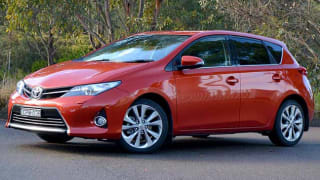
Toyota Corolla Levin ZR 2015 review
Malcolm Flynn road tests and reviews the Toyota Corolla Levin ZR hatch, with specs, fuel consumption and verdict.
Browse over 9,000 car reviews
Typically diesel has been more expensive than petrol, which means it takes more time for buyers to recoup the $2000 to $4000 premium for a diesel-powered car.
But since January, diesel pump prices have been heading south and petrol prices north. In the middle of January the average price of diesel across Australia was 18c a litre more than petrol. By the end of March it was 3c cheaper and now it's on par.
The i30's new turbo diesel engine, combined with a new dual-clutch automated transmission, is the headline act of a midlife nip and tuck for the popular small car.

The combination delivers more grunt using less fuel. Power is up by a slender 4kW but more importantly the engine's torque — or pulling power — is up by 15 per cent, or 40Nm. At the same time fuel economy has improved from 5.6L/100km to 4.9L.
You can feel the extra oomph on the road
You can feel the extra oomph on the road. Around town, there is a bit of hesitation off the mark before the turbo kicks in but, once you're on the go, it responds impressively to throttle inputs.
The engine also lopes along at low revs on the open road, as the seven-speed picks the tallest possible gear to maintain momentum. It's a similar story around town. At 60km/h, you're in sixth gear and by 70km/h you're in seventh. The only downside is a bit of vibration as the engine hovers low in the rev range.
Economy is impressive, though. In heavy traffic, we used 7L/100km but on a long loop incorporating freeway cruising and a climb through some twisty secondary roads, our i30 averaged 4.6L/100km.
With a 50-litre fuel tank, a 1000km journey on a single tank is a possibility. Hyundai has managed to tame the noise of the diesel pretty well. Small cars are by nature noisier to begin with, but the i30's diesel only really intrudes at idle and off the mark under heavy acceleration.
Dual-clutches can be jerky, hesitating off the mark, but the i30's changes are pretty seamless.
The dual-clutch transmission is one of the smoother examples of the breed. Dual-clutches can be jerky, hesitating off the mark, but the i30's changes are pretty seamless.
It's not all good news.
Even with the price gap closing between petrol and diesel, the oil-burning i30 will still take years to repay the premium Hyundai charges for the model. The driveaway price of the diesel auto is $25,990, or $4000 more than the equivalent petrol model. At today's fuel prices, the diesel would cost roughly $500 a year less to run, based on an annual average of 15,000km.
However, diesel isn't just about savings at the petrol pump. The new engine, combined with the slick-shifting seven-speed transmission, delivers appreciably better performance, both at cruising speeds and when tacking a twisty back road.
Elsewhere, the changes to the i30 range are for trainspotters. The new model adopts the brand's new front end styling and adds a standard reversing camera on the most affordable model, complementing the existing reverse parking sensors.
There are new head and tail-lamp treatments and new wheels on some models, while inside the biggest change is a new five-inch touchscreen for the cheapest model featuring Bluetooth audio streaming and integration with the Pandora digital radio app. On the most expensive SR Premium and Premium variants, there are now ventilated front seats.
The ActiveX variant joins the range. It adds $1100 to the price of the Active and includes machined-face alloy wheels and electric folding external mirrors with integrated LED indicators. Inside, there are leather-appointed black trim, illuminated sun visors and extra ambient lighting.
A capable and secure car on the open road, it doesn't soak up the bumps as well as the best in its class. And the ageing cabin could have done with a more substantial update. Then there's the Free Trade Agreement that delivered savings on Japanese cars but hasn't done the same with the i30. Prices have remained largely static, although the brand has added more equipment and kept keen driveaway pricing.
The Active still starts at $21,990 driveaway, while the SR model is $1000 more than the similarly equipped Premium it replaces, but now includes the more powerful 2.0-litre engine.
The lack of substantial change is unlikely to make much of a dent in the car's success in the short term, though. It remains attractively priced, especially when you take into account its generous five-year warranty.
The update will do enough to keep the i30 near the top of the sales charts, although the car is starting to show its age a little, especially against newer rivals such as the Mazda3.
| Vehicle | Specs | Price* | |
|---|---|---|---|
| Tourer Active 1.6 Crdi | 1.6L, Diesel, 6 SP AUTO | $11,990 – 15,950 | 2015 Hyundai I30 2015 Tourer Active 1.6 Crdi Pricing and Specs |
| Tourer Active 1.6 GDI | 1.6L, ULP, 6 SP MAN | $11,110 – 15,290 | 2015 Hyundai I30 2015 Tourer Active 1.6 GDI Pricing and Specs |
| Tourer Elite 1.6 Crdi | 1.6L, Diesel, 6 SP AUTO | $12,760 – 17,050 | 2015 Hyundai I30 2015 Tourer Elite 1.6 Crdi Pricing and Specs |
| Trophy 1.6 Crdi | 1.6L, Diesel, 6 SP AUTO | $10,340 – 14,190 | 2015 Hyundai I30 2015 Trophy 1.6 Crdi Pricing and Specs |
$9,999
Lowest price, based on 303 car listings in the last 6 months